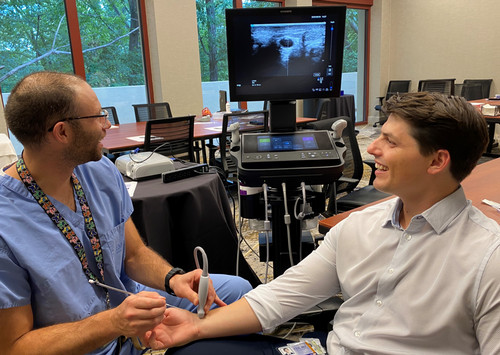The Clinical Expert/Educator Pathway
This pathway is intended for trainees who wish to develop special clinical expertise in a subdomain of pulmonary or critical care medicine, and/or refine their skills as educators.
Fellows enrolled on the Clinical Expert/Educator Pathway have several required experiences in which they must participate during their latter two years of training:
-
Interventional pulmonology - During this rotation, fellows gain a greater degree of experience in basic bronchoscopy, as well as beginning to develop the skills needed for more advanced procedures, including endobronchial ultrasonography, navigational bronchoscopy, rigid bronchoscopy, tube thoracostomy, and bedside tracheostomy. Some experience with stenting and endobronchial laser use is also common.
-
Trauma unit at Grady - Fellows will rotate with the surgical trauma team at Grady's level 1 trauma center, assisting in the management of the critically ill, injured patients, with the multidisciplinary trauma team.
-
Surgical intensive care at EUH - This twenty-bed unit admits both general and specialty surgical patients. The multidisciplinary team consists of supervising faculty from the Departments of Anesthesia, Surgery and Emergency Medicine, as well as residents from each of these specialties.
- Cardiothoracic ICU- the cardiothoracic care rotation provides basic knowledge and clinical experience in the work-up and management of critically ill cardiac and thoracic surgical patients. The rotation site is the cardiothoracic critical care unit at Emory University Hospital which is staffed by the attending anesthesia trained intensivist, nurse practitioners/physician assistants, residents and critical care fellows. This unit is home to the ECMO program at Emory.
- Neurosurgical unit- The neuro-critical care units are located at Emory University Hospital and Grady Memorial Hospital. They are staffed by an attending neurointensivist, neuroscience nurse practitioners and a neurocritical care fellow.
- Pulmonary Transplant- The pulmonary transplant rotation is a required second year rotation that gives fellows exposure to both inpatient transplant patients (including the immediate post-operative period) and outpatient transplant medicine, including initial evaluations for lung transplantation, as well as medium and long term follow-ups.

In addition to a number of other elective experiences, fellows enrolling on our Clinical Expert Track may identify a specific subspecialty within pulmonary or critical care medicine on which to focus; common choices have included interstitial lung disease, pulmonary hypertension, transplantation, interventional pulmonary, sleep medicine, and quality improvement in critical care. During the latter two years of training, fellows will dedicate at least eight months of time in rotations related to this specific domain, consisting of both clinical months and protected time for scholarly projects (including research abstracts, review articles and book chapters). Through this process, the fellow will complete the training program with a "distinction" in this subdomain of pulmonary and critical care medicine.
Each specific sub-subspecialty has its own list of required rotations; as an example, the list of required experiences for fellows interested in focusing on pulmonary vascular disease is provided below:
-
Three months of outpatient pulmonary hypertension
-
One month of the inpatient advanced lung disease service
-
One month of cardiac ultrasonography
-
One month of congenital heart disease clinic
-
One month of the Emory Hospital cardiac intensive care unit
-
Two weeks of cardiothoracic surgery
-
Two weeks of interstitial lung disease clinic
-
Two weeks of rheumatology clinic
The Physician-Scientist Pathway
The Physician-Scientist pathway is intended for fellows who want to pursue a career focused on research in clinical, translational, epidemiologic, health services, or basic science domains.
Fellows who opt to enroll on this pathway will complete their clinical training during the first half of the second year with the following required experiences:
- Interventional pulmonology - During this rotation, fellows gain a greater degree of experience in basic bronchoscopy, as well as beginning to develop the skills needed for more advanced procedures, including endobronchial ultrasonography, navigational bronchoscopy, rigid bronchoscopy, tube thoracostomy, and bedside tracheostomy. Some minor experience with stenting and endobronchial laser use is also common.
- Trauma unit at Grady - Fellows will spend either two or four weeks rotating with the surgical trauma team at Grady's level 1 trauma center, assisting in the management of the critically ill, injured patients, with the multidisciplinary trauma team.
- Surgical intensive care at EUH - This twenty-bed unit admits both general and specialty surgical patients. The multidisciplinary team consists of supervising faculty from the Departments of Surgery and Emergency Medicine, as well as residents from anesthesia, surgery and emergency medicine.
- Neurosurgical unit- The neuro-critical care units are located at Emory University Hospital and Grady Memorial Hospital. They are staffed by an attending neurointensivist, neuroscience nurse practitioners and a neurocritical care fellow.
- Pulmonary Transplant- The pulmonary transplant rotation is a required second year rotation that gives fellows exposure to both inpatient transplant patients (including the immediate post-operative period) as well as outpatient transplant medicine, including initial evaluations for lung transplantation, as well as medium and long term follow-ups.
- Cardiothoracic ICU- the cardiothoracic care rotation provides basic knowledge and clinical experience in the work-up and management of critically ill cardiac and thoracic surgical patients. The rotation site is the cardiothoracic critical care unit at Emory University Hospital which is staffed by the attending anesthesia trained intensivist, nurse practitioners/physician assistants, residents and critical care fellows. This unit is home to the ECMO program at Emory.

Over the course of the next 24-30 months, fellows will engage in research under the supervision of one (or more) of our experienced mentors. Although it is strongly advised that fellows choose a member of our Division as their primary mentor, a fellow may choose to work with a mentor from outside the Division, particularly if that mentor has a collaborative relationship already established with one or more of our faculty. In addition to developing original research projects under the guidance of their mentor, fellows learn how to analyze data, prepare and deliver scientific presentations and write and publish original scientific manuscripts. Successful completion of this track requires fellows to present their scholarly work to both internal and external audiences.

